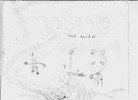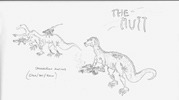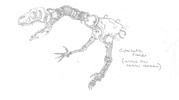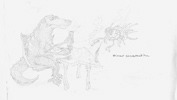Scott Lynch's Blog, page 4
August 24, 2012
My Embarrassing Juvenilia, Part One of Several
I’m back home in Wisconsin, and more or less well, and upright and functional again after getting savagely whiplashed by that damned virus I brought with me… chills! Shaking fits! Lassitude! Sweating fits! Major stomach upset! Everything but a chestburster. Not quite the begging-for-death spectacle that H1N1 was a few years back (imagine a weekend in which approximately 20 pounds of sweat jet from every pore in your body, like you’re some sort of water porcupine). Nor the pneumonia that made my 2006 UK book tour such a joy for everyone. Nor the binary clusterfuck that resulted when I returned from my 2010 UK visit with a nasty flu, and neglected to refill my antidepressant prescription for… a truly stupid length of time. But this thing made a solid fourth-place showing in the Pathogen Olympics.
From the Department of More Gooder News: I did manage to see both Emma and Steve at lunch last week before I was confined to sick bay, and I dispersed to them their shares of your generosity that had poured in by that point (I expect to see them again after Worldcon). Emma was on her feet again post-surgery, with a fetching bandana covering her Sweeney Todd-esque surgery souvenir.
Steve had his own surgery two days ago; by all reports it too went well, and he’s back at home, tweeting and chafing under his post-op instructions, which appear to be “don’t have any fucking fun for two weeks or you will explode.”
Now, thanks to several ludicrously generous donations of late, we are PAST the $4,000 mark, and thus past the point where I owe you the crown jewel of your faux-Kickstarter “prizes.” Oh, you poor creatures. I am still hard at work on the bigger QotIS e-book, having set myself a bit backwards while attempting to work on it while I was still sick and feverish. I have, however, had a long dance with a scanner.
Context! When I was a teenager, I suffered from the delusion that I was going to grow up to be a comic book self-publisher. In those long-ago pre-ebook days, self-publishing went through a sort of mini-golden age wherein all kinds of hip, quirky, niche-hunting stuff that had no chance in hell at any major publisher managed to flourish, or at least bob gamely a few times before sinking. It seemed like genuinely important battles over creators’ rights were being fought before my eyes, month by month, in letter columns and at summits and conventions in exotic places like Everywhere Else But Where I Lived. I wanted to be Dave Sim when I grew up… in those amazing times before he went catastrophically bugfuck nuts, he was my honest-to-god hero.
My collection included Cerebus, True Swamp, Wandering Star, Stray Bullets, Bone, Rare Bit Fiends, Starchild, Strange Attractors, Hepcats, Poison Elves, A Distant Soil, and similar charming weirdness. Said collection, by the way, was stolen in 2000 (whether the thief was expecting pristine Wizard magazine price list investment fodder, or just happened to have randomly exquisite taste in comics, I’ll never know).
Anyhow, there I was, dreaming of a future writing and drawing until my spine snapped in half. Fortunately for myself, and for everyone spared an opportunity to read the stuff I planned, I lacked the discipline to take my illustration past a certain plateau. The following sketches in a 10 x 15 pad still survive; I adjusted the scans a bit in Photoshop to make the pencil work as clear as possible. Thumbnails link to larger versions.
1. Cover sketch for Orbison the Alien, 1994-1995
Orbison was intended to be my first foray into self-publishing, a four-issue limited series about an alien broadcast monitor who crashed his personal saucer on Earth and was forced to scrounge up temp work, attempting to communicate using the limited patois of pop culture references he’d gathered from scanning our TV channels. If it sounds like a one-joke concept, that’s ’cause it was. I planned to write, draw, and publish this during my senior year of high school, and by providence I discovered roleplaying games instead. Which was amazing luck… even if I had managed to create the pages, any attempt by me to run a business at that point would have been raw atomic failure.
2. Concept sketch for The Mutt, early 1995
The Mutt was the project I intended to follow Orbison with, a seven-issue science fiction series based on the dumbest premise ever… well, surely a dumbest premise ever. But it did feature a moderately cool alien species obviously based on Velociratpr/Deinonychus. I called ‘em the Chensakau (and later adjusted that to the more poetic Chensathra). The influence of David Brin’s Uplift universe on this project was extreme.
3. Chensakau cybernetic combat skeleton concept, 1995
The Chensakau were intended to be a cybernetics-happy species, for a very Cyberpunk 2020 value of ‘cybernetics.’ Their elite royal commando formation, the Giirdaan Regiment, were augmented to ludicrous extremes. You can see from this conceptual sketch of a cybernetic skeleton replacement that I had no real grasp of concepts like “surgically feasible” and “guaranteed death on the operating table.” I mean, damn. Poor space reptiles. “Now comes the part of the operation where we hold your brain very, very gently while we replace your entire skull all at once. This is why you earn your hazard pay, lizard marine!”
I must give my dumbass teenage self a tiny bit of credit, and admit that there are perhaps less cool things in the universe than the notion of hundreds of cybernetic velociraptors pouring across a landscape with laser guns in hand and grenade launchers sticking out of their spines.
4. Chensakau architectural concept, 1995
The original caption, which didn’t fit into the scan, read: “The Imperial Tower, 15,000 feet high. Home of the Empress on the Chensakau Homeworld.” I was aiming for a bio/mechanical hybrid aesthetic, buildings that looked almost grown, studded with technological features and surfaces. This is a concept I’ll revisit at some point, in a story that makes sense.
5. Extraterrestrial dinner conversation, 1995
I’m not sure if the diner on the left was meant to be a Chensakau, or just a variation on a theme. Another major influence on me all those years ago was Barlowe’s Guide to Extraterrestrials, an extraordinary work created by a genuine artist when he was just a couple years older than the Scott that produced these sketches.
6. Embarrassing Cyberspace Trilogy Fan Art, 1995
A third major artistic lodestone in my teenage years was cyberpunk, particularly the earlier work of William Gibson and the goofily lovable CP 2020 roleplaying game. This, I think, must have started out as a sketch of one of my characters; by adding MAAS-NEOTEK to his t-shirt I suppose I transmogrified it to Gibson fanart. And doesn’t the woman in the background look thrilled to be there?
More to come…
Mirrored from Lynch Industries.
August 2, 2012
Lynch Industries
I am absolutely going to continue reading LJ, routinely logging in, and surveying my friends list. But henceforth, my primary blogging will be at:
http://www.scottlynch.us/blog/
P.S. Most of the relevant stuff there will be mirrored here.
P.P.S. I am going to close down my Dreamwidth account, which I never found an easy way to deal with.
May 21, 2012
THE VOYAGE OF THE SPACE BEAGLE by A.E. van Vogt
It's been a while since I bored into a book like a hopped-up literary woodpecker, so here's some brain spillage originally written last year and never posted. 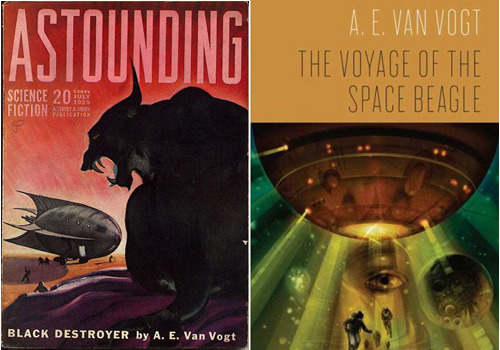
Left: "Black Destroyer," 1939
Right: Current edition from Orb Books.
Hot jets, Kinnison! What a jaunt in the way-back machine this is. I first became aware of The Voyage of the Space Beagle via Barlowe's Guide to Extraterrestrials as a kid, and once again waited a mere two decades before reading the source material. At this rate, I'll have all of my seventh-grade math homework turned in by December, 2013.
Voyage is a 1950 fix-up of four previously published short stories, forming a loosely chronological account of the titular Space Beagle's multi-year exploration beyond the confines of the Milky Way. Its thousand-man crew, chemically castrated for the duration to keep their minds firmly on Doing Science, is preyed upon by a series of increasingly dangerous creatures, and must also deal with internal pressures, scientific disputes, and a case of dreaded SPACE MADNESS.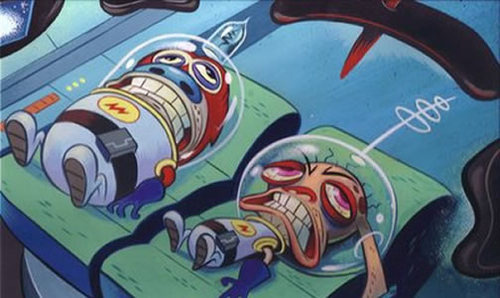
The Voyage of the Space Beagle was influential as all hell, out of proportion to what's actually on the page. Philip K. Dick claimed van Vogt as a major influence; so did Harlan Ellison. You can see it here, a distinct flavor that was carried into Ellison's early SF work. You can also see this book's profound effect on Star Trek, with its strange planets, predatory aliens, and mysterious threats to the ship. Van Vogt even took legal action against the producers of the 1979 movie Alien, a suit that was settled out of court, based on arguable similarities between xenomorphs and his own egg-implanting Ixtl.
Voyage is an affable relic of the Big Science Done Big era of SF. The ship jaunts about at hyperluminary speeds, courtesy of Whoosh-Zoom engines powered by authorial whim. There are all the expected toys... gigantic heat-rays, semi-portable atomic furnaces, visiplates, vibrator guns. It has the same ludicrous-but-lovable feel of Doc Smith's Lensmen series, where scientific progress is almost always just a matter of dumping more power into a bigger thingamajig (if you yelled "BUS BARS!" just now, bless you).
What it isn't, curiously enough, is a true log of a voyage and its voyagers. The episodic nature of the story would be less stark if there were some context provided, some glimpse of home, some notion of how the Space Beagle compares to anything else humanity is doing. Exploring vacuum in a vacuum is not as interesting as it could be. No real narrative integument was provided when these short stories were stitched into the vague shape of a novel.
Also, the real heart of the book, for which the voyage is merely a framing device, is how an advanced interdisciplinary approach to the sciences called Nexialism proves the best solution to each of the Beagle's challenges when the more stratified and traditional sciences allegedly fall short of the big picture. This is all well and good as far as hobbyhorses go, but it would have helped the story if some of the solutions implemented to fend off each alien attack weren't so conveniently dim-witted.
For example, in the novel's first major incident, adapted from the short story "Black Destroyer," a panther-like creature called coeurl feigns harmlessness to get aboard the Beagle. Coeurl is actually a ravenous, ultra-strong, life-draining predator, with the ability to detect and manipulate energy using whisker-like appendages. It can neutralize the deadly force of human weapons, a fact the humans realize once the thing is on the loose and killing people. So, when coeurl (constantly referred to by the men as "pussy")* locks itself in the Beagle's engine spaces, what do they do? Do they even attempt to poison it? To asphyxiate it? Nope. They wheel out their gigantic heat-ray projectors and start melting their way into the engine room.
Yes. To deal with an energy-manipulating creature, they hurl more energy at it! While it's mucking with the ship's engines, no less. The Beagle is described as having a truly impressive workshop capacity, but even so, you'd think the notion of blasting apart your own engine compartment when your ship is thousands of light-centuries from home would give sober and non-libidinous men pause. What do they expect to do if they melt their propulsion center, break out the oars?
There is also a puzzlingly gimlet-eyed overuse of purely speculative social science (though van Vogt deserves props for making his social scientist, Korita, Japanese in a time when the Japanese were not exactly sympathetically portrayed in much American media). Korita is constantly brought on stage to speculate on the social structure and cultural foibles of the singular aliens the Beagle encounters, always in the complete absence of any shred of context or evidence. Yet Korita is made to accurately diagnose potential weaknesses in the hearts and minds of these creatures (nobody even brings up the possibility that these entities might be outcast or atypical) This ain't science, even in a context that generously allows for atomic rayguns and Whoosh-Zoom engines. It's bullshit without a scaffold.
Despite this, The Voyage of the Space Beagle still moves smoothly across the eyeballs in a way too many of its contemporaries couldn't aspire to even when they were fresh. It's reasonable and penetrable fun; penetrable, perhaps, because it had such a hand in defining a certain geometry of space opera still quite familiar to us decades later.
Damon Knight was often criticized for his perceived harshness toward van Vogt's work, but I think Knight judged fairly in 1950 when he wrote: "...this department's thesis on van Vogt is (a) that the man has a very respectable talent as a writer, and (b) that he consistently misuses it." Van Vogt operated energetically in both the thoughtful and thoughtless modes of invention, and if he fell short of constructing mature narratives, at least he had the ability to occasionally evoke real feelings of mystery and awe.
*****
*It is an exceptionally juvenile cheap shot, I admit, but it's difficult to keep a straight face at frequent reference to how the voyagers "beat pussy" and "chased pussy off the ship." They're two million light-years from the nearest woman and drenched in libido-deadening drugs; no shit they chased pussy off the ship.
May 18, 2012
Bullet Points of Interest
This isn't "a sense of entitlement" issue. When did the notion of not bending over for masochistic random aggravation in the course of our amusements become suspect? My copy of Skyrim doesn't jump out of my XBox 360 every time someone at Bethesda accidentally nudges a server. The Amber novel I was reading last night didn't burst into flames if I ceased to maintain psychic contact with Roger Zelazny's ghost. You say you've got a game that offers all the technological aggravations of an MMO, all the time, even when I'm not receiving any of the benefits? I say that makes my bookshelves look even more attractive than usual. En Taro Adun, Blizzard. For the first time since 1995, I'm watching one of your trains pull out of the station without me on it.
Hey, that girl I like, booksmith extraordinaire Elizabeth Bear, has another delightful thingy freshly available. It, too, will not become unreadable when your internet connection goes down.
Bear and I will be at WisCon 36 next weekend! I am not doing any panels or formal events (save for the mass signing thingy on Monday), but I have volunteered to be a dutiful bar-gnome at the CHICKS DIG COMICS launch party, in room 634 from 9 PM Saturday until Jesus-It's-Late-AM Sunday.
Also: CHICKS DIG COMICS. Buy one. Read it. Use it to swat people who don't fucking get the picture. Just don't aim for their heads; the skulls are usually too thick for physical attacks to have any effect.
At said WisCon, I will be handing over some papers to the awesome Lynne Thomas, and thereby taking my first step into the dark recesses of the SFWA Collection at Northern Illinois State University. It will not be a terribly exciting archive at first, but NIU will be the place to go in the future if you're a scholar wishing to be thoroughly bored by my manuscripts, juvenilia, and detritus.
This is the first year in which I'm going to be attending a Worldcon, and also the first year in which I'm going to be voting on the Hugos. Much of that near-future time I'm not spending swearing at my internet connection will be spent dutifully reading the voters' packet material, which just became available.
I am thoroughly impressed with just how quickly the more egregiously, obviously comprehension-challenged responses to John Scalzi's "Lowest Difficulty Setting" piece began to resemble rants from the motherfucking TIME CUBE guy. YOU ARE EDUCATED STUPID, JOHN SCALZI! Pro Tip: Time Cube Guy is not an emulational model. If you find your arguments resembling his in tone and coherence, back away from your keyboard. Apply vodka liberally to all unsoused brain nodules. When you awaken, open an account at the nearest clue store.
I wish I could tell you a Very Neat Thing. Actually, I have three specific Very Neat Things I am kinda dying to announce. One is good to spill the beans on, one is nearly so, and one is still under publicity embargo. I'd kinda like to be able to spill more than one simultaneously, though, so let's hope I get some directions this coming week.
Hints? You want hints? You have me confused with GRRM.
I wish my bank account had me confused with GRRM.
May 3, 2012
Flat Box Furniture From Big Box Stores
*****
TO THE MAN WHO DESIGNED THE TABLE I JUST ASSEMBLED
Oh, it's death for you, my boy
but not for a good long time.
An elastic interval, shall we say, between points A and B
where B is the furnace, and A a fine assortment
of power tools.
Yes, we're going to have some words, you and I
Though whether they'll come before or after
the piranha
is an open question.
I like to give my whims room to breathe.
See, I never understood how events might conspire to make a supervillain
but congratulations!
I’m fresh from the forge.
With hex wrench imprints on nine fingers.
In fact, if I ever see another piece of lacquered particleboard
ever
again
I'm going to punch a baby dolphin to death. Yes.
And take the corpse to a childrens' hospital.
And give it to a kid hooked up to a dialysis machine.
Because it's not like he'll be able to run away.
Not easily.
By the way, when I said piranha
you thought I meant tank?
I meant solution.
Seems I spent my aquatic horror budget on the blue-ringed octopus.
Expensive!
You wouldn't think you could slip such a thing through customs
(and honestly you're not supposed to)
but have you ever read Bruce Schneier's blog? Edifying stuff.
Anyhow, pay attention now
As this concerns you:
My Allen Wrenches have just come white-orange off the fire
and tied up like that, you look like a table.
So much like a table.
In very serious need
of tightening.
April 23, 2012
What We Talk About When We Talk About Bear (II)
I wanted to unroll a little bit more about Elizabeth Bear's work in relation to Range of Ghosts, with an observation about her stuff in general:
One of the most telling things about an author's body of work is where their gaze keeps settling. Bear chooses time and time again to peer closely at characters devoid of traditional sympathy or empathy flags, characters that other authors might deploy because of their intrinsic inhumanity. Whether it's a battered, abandoned war-mecha ("Tideline") or a put-upon sex android ("Dolly") or a starport grafitti artist ("Two Dreams on Trains") or a goddamn Shoggoth (!)("Shoggoths in Bloom") or any of the myriad characters that have crawled, broken but unbowed, across the starships, cityscapes, and theatre stages of her prodigious stack of novels, Bear keeps an illuminating eye firmly on the ostensibly unsympathetic.
From these easy-to-stereotype types she constantly dredges telling quirks and peels open inner lives. Bear doesn't much use the traditional trappings of mammalian cuteness to signal to her audience that it's okay to feel for something. There are no cute chirpy robots in her worlds, no wisecracking sidekicks, nobody singled out to wear one emotional stripe forever. In the Elizabeth Bear version of Star Wars Episode I: The Phantom Menace Jar-Jar Binks wouldn't flail and shit-step and pratfall his way across the narrative; it goes without saying that he wouldn't be a half-witted pixellated Rastus figure, either. In fact, I am now ensnared in a tangent, and desperately sorry that the world will never see that movie as Bear might have written it.
Bear pries secrets and desires out of the unlikeliest places; she reflexively invests her creations with agency the way too many authors habitually rub it out. Agency, by the way, is not a synonym for political authority or combat prowess or physical strength or social sanction within a narrative. Agency means that an author recognizes and respects that each character has motivation, wants, and an inner landscape; it means treating them as something more than props and puppets. It means writing them as though their hearts and heads have actual contents deserving of examination. The ability to swing swords and wear crowns and command ships has nothing to do with it.
Bear gets this, with rare style and intensity. Everywhere she looks, even inside thick shells of cliche and cold bodies of metal, she finds people. This is an important thing to keep in mind when diving into Range of Ghosts...
To be continued!
April 13, 2012
Jim Hines' Rape Crisis Center Fundraiser: The Book of Bear and Lynch
My partner, the lovely and talented Elizabeth Bear, has a little new book out that you might have heard of, called Range of Ghosts. Bear and I are making a hardcover copy of RoG our prize contribution to Jim's fundraiser.
But this is no ordinary copy of the book... from April 16th to May 6th, Bear and I are zooming hither and yon across the northeast, from NYC to Boston to Albany to Maine and back again. We'll be bringing the book with us, scribbling dueling notes in it at each other, drawing in it, and inserting mementos, postcards, and other little surprises into its pages. By the time we're finished with it, it'll be one uniquely encrusted hermit crab of a book, chock full of weirdness. One of god's own prototypes, never even intended for mass production.
And it can be yours... with a little luck, and with a donation to an extremely worthy cause.
April 1, 2012
Ever the Reluctant Warrior, I Take Up My Sword for Justice
Astute readers are no doubt aware of Scalzi's extensive history in the fantasy genre where he, like a reverse Jesus Christ, labors ceaselessly to turn the heady wine of invention into piss-warm pondwater. If it were possible to make a clever literature-relevant metaphor about bread or fish here, you can rest assured that I would, but unlike world-class douchebastard John Scalzi I have an abiding sense of proportion and restraint.
Tor Books, obviously hard up for cash (an anonymous but trustworthy source tells me that John Scalzi insists on being paid in jelly donuts frosted with gold leaf and black tar heroin), has undertaken to publish a manga version of Scalzi's absolutely stolen, plagiarized, misbegotten Shadow War of the Night Dragon trilogy.

Come on! This is the worst thing Scalzi has done since he bribed the jury to ensure that his "experimental sexno-thriller" Colt Jackhammer: Pussy Magnet (Baen Books, 2010) won the Tiptree Award. And he did that last fucking year!
The Shadow War of the Night Dragon, in a just world, would be more properly known as The Night Shadow of the Dragon War and the author bio would describe ME, plus maybe some tasteful mentions of my biceps and the photo would be of me flexing my arms over a book on feminism or something, and I'd be half in shadow like I was about to attack, you know, and punch sexism in the face. But it would be low-key, of course, because I am not one to toot my own horn, unlike twitchy weasel-dicked scum merchant John Scalzi.
You see, in the winter of 1985, when I was 7, I began writing my very first epic fantasy, a work that eventually ran the full length of six Big Chief tablets. It was fresh, startling, and vital. Where my classmates unquestioningly accepted the bourgeois norms of such televisual soporifics as Thundercats and Silverhawks, I strove to question and subvert all genre essentialities. I called my mytho-fantabulist construct The Night Shadow of the Dragon War; no doubt you see the elegant refuted symmetry of my classist deconstruction and my tasteful shout-out to Omar Khayyám. If you do, you see more than the all-pilfering moral leper John Scalzi, who, near as I can tell, must have entered my house some time around Christmas, 1985, and stolen those Big Chief tablets.
How, you ask, would John Scalzi, who was then 16 years old and living several states away, have even known about the existence of my early masterwork, let alone how to travel to my house without parental permission and break in without leaving any visible evidence? These are VERY EXCELLENT QUESTIONS in that they indicate just how thoroughly Scalzi prepared for his heist, and what obscene lengths he was willing to go to to get his hands on something so plainly beyond the scope of his half-eaten gerbil pellet of a brain. Considered from this perspective, these questions can only be described as damning.
I have brought this evidence time and time again to Scalzi's publishers at Tor, and they have consistently obstructed my efforts to clear away the miasmic perjury-fog that wafts from Scalzi like stink from a man-sized colon. In fairness I should note that it would not be a particularly tall man-sized colon. Despite all hindrances, I take this battle very seriously and pursue it still. I give you my latest e-mail from editor Patrick Nielsen Hayden verbatim:
"What part of "restraining order" do you not understand, you crazy motherfucker? Bother me about this again and I swear to god, our lawyers will eat your balls on toast. Are you stupid, or are you just fucking stupid? --PNH"
This sort of abuse is absolutely typical of Patrick. It's why I submit all of my manuscripts to him using pseudonyms and why I am so going to laugh my ass off when he finally buys one. The ignorant FOOL. I look forward to the day that he tweets about his latest acquisition, not realizing that I follow him on Twitter and will immediately RT him with the evidence of his own blazing shame.
Justice is like a lonely submarine. Sometimes it must lurk beneath the waves for months at a time until the target floats by.
But I digress. In the end, what's important is this: The Shadow War of the Night Dragon is probably the worst thing John Scalzi has ever done. And he wrote the novelization for Meet the Spartans.
March 31, 2012
Computer Blew
My Macbook, my companion on literally every trip I've ever taken as a professional writer, is finally crawling off to the elephant graveyard. Just flipping it open knocks the wind out of it. Its case is pitted and battered by everything from cat fangs to hot coffee cups. I've been putting off replacing it for years, but at last the time and finances are right. And I'm buying a Windows machine for the first time in my entire life.
See, I'm a Mac-ite of an old school. Not the oldest, but sufficiently old, harkening back to the late 80s. My school days were spent playing with the Apple II. In junior high I would stretch a point of my mother's school employee access to a more advanced lab filled with beige box Macs. She even got to borrow one from the district each summer, and much of my earliest coherent writing was done on them (as well as a lot of Chuck Yeager's Air Combat). So I've long preferred to work on the platform with which I'm most anciently and intimately familiar, and as far as my desktops are concerned, that's always going to be the case.
But I've been wanting a token Windows machine, to serve as an operating environment for some stuff I can't talk about yet. And at this point a Windows laptop is more financially responsible than a new Macbook.
But there are... issues with transitioning from the Mac-user mindset to a Windows-buyer mindset. It's perfectly possible to be a savvy, up-to-date, tech-minded Mac user, but the thing is, if you want to be a completely cotton-brained ignoramus, the Mac will accommodate you. You don't have to be able to count to four in order to buy or use a Mac. You don't even have to be able to identify the gas your lungs are metabolizing as you read this. As far as even the most comatose crustacean of a user need be concerned, Macs don't have tech specs. They have fucking mana bars.
Buying a Mac is simplicity itself. You go to the Mac temple store or the Mac site. You pick one that looks pretty. There are drop-down windows that tell you they're powered by baby otter farts or wood nymphs or whatever, but you don't need to care. It arrives at your house, you unbox it, you plug it in, and it just works. It's amazing, how little of a shit you need to give about a Mac's innards most of the time. Here, let me show you my system profiler:

My processor speed is bunny and my RAM is rainbow! This machine will last me for ten years.
Contrast this with the process of constructing a Windows machine prior to purchase... suddenly your components are not installed and magically synchronized by helper elves. You actually have to pay attention to which device pairings will make the goddamn planet blow up. You have to research which video card is standard this week. You have to get the proper RAM chips in the proper configuration, and then get RAM in your RAM because you like RAM, and 64-bit that motherfucker plus an optical drive that doesn't cause cancer in mammals coupled with one of seventeen available versions of the OS, not all of which are supported by your thirty-six choices in Intel Core geometries. Suddenly it's less like using a website and more like that part in Star Trek IV where Spock is getting his fucking brain tested.

And THEN, once you've built and received your new Windows laptop, o Mac-addict, you need to start paying more attention to another serious issue: security. See, while Macs are more popular and numerous than ever before, it's still a truism that most of the jackholes writing viruses can't be arsed to even target such a fringe-y cult when there are vast fields of incompetently-maintained Windows machines planted in neat furrows to be harvested. I've accidentally triggered or opened virus bullshit before, and it's like it just... senses I'm on a Mac, puts the gun back in its pocket, shakes its head, and leaves. Out of pity.
But henceforth, it's like the atmosphere around me will be full of invisible flying dicks all striving to plunge themselves into my hard drive. I look forward to paranoia reversing the progress I've made in controlling my blood pressure.
Now, having to fret about choosing a book-sized portable wonder box containing many times the processing power of the computers used to send Apollo missions to the fucking moon is definitely a "First World problem."
I am just letting off steam with some unstructured grumbling. Please note the following:
Yes, I know about Boot Camp. I still want a separate Windows machine I can set down beside my desktop Macs.
I have already selected my laptop package. I already have supremely knowledgeable friends and associates lined up to assist with it. I do not want advice. I do not care what you think I should be using in place of whatever you think I'm using. Certain parts of my rant may have been exaggerated for comic effect. Mac users should optimally be able to count to eight, not four. My startup disk actually has a rating of strawberry cake, not chocolate.
March 30, 2012
Dear Epic Fantasy of the Very Late 1980s...
Alas, time has worked its alchemy on the pleasure centers of my brain, and they've become such fussy precision instruments. I suppose as adults the term we use is "more discriminating." Those old Sense-of-Wonder nodes are still there, resting in the deep darkness, but you can't just flounce on in unannounced and slap them like you used to. I've sort of rearranged the furniture, you see. It's like an obstacle course in there, and all the weak, lumpy, misshapen ideas that used to tickle me without trouble just can't find their way past the gauntlet.
Maybe it's my fault, for conceiving the notion that we could recapture what we shared fourteen years ago. It started as an exercise in curiosity, and while it was rocky at first (my younger self had a great deal more tolerance for languorous chapters of fuck-all happening to anyone, and for thick-headed teenage protagonists too dim to walk in a straight line) my perseverance paid off in an ultimate reading experience that was not entirely excruciating. Heartened, I vowed to turn it into a sort of state-of-the-genre survey project, and continued to your second volume.
Which is where the metaphorical primate had sexual relations with the hypothetical football.
See, you've got this character who happens to be an unusually educated swamp-dweller. A wiry little man with a very able intellect, undervalued by his own people, and decidedly one of your more engaging characters. This poor fellow sets off on a journey by flat-bottomed boat, up rivers and across mangrove swamps, during which he dangles a hook and attempts to catch some nourishment.
This he does, reeling in a fish of commendable size, a fish so large and powerful he can't immediately haul it into the boat for fear of snapping his line. No worries. He decides to let the fish tire itself out before trying again. Alas for him, he notices the dark shape of a crocodile slipping from the bank into the river, obviously intent on eating his lunch.
I have to confess that I lacked the creativity to predict what our hero, the experienced swamp-dweller, quite an expert on dangerous amphibious animals, would do in response.
He dove into the water and put himself between the fish and the crocodile.
That's right. This lean, aging fellow, unskilled in arms, attempted to distract a crocodile away from a fish using his own mortal body, despite obviously knowing what crocodiles can do to human beings in water.
I wonder why your author, so plainly enamored of the notion that this poor fellow's life needed Exciting Complications Leading to a Cliffhanger, couldn't find it in his heart to use any of the other narrative tools just sitting there, gleaming, ready and eager to be deployed. Why not endanger the boat with a bout of bad weather? How about an attack from hostile forces? How about a surprise attack by dangerous aquatic life? Nope. I'm afraid your author decided our swamp-dweller should do something transparently, frustratingly witless. Not merely an act born of hubris, arrogance, mental incapacity, or anger (though he attempts to lampshade things by having the character curse himself on those terms), but absolute plot-convenient stupidity without any laudable underpinning.
That snapping sound you just heard was my suspension of disbelief as the trap door finally opened beneath it and the noose jerked tight around its neck.
And so, I wish I could say "it's not you, it's me." While my tastes have changed, they haven't changed so much that I couldn't make a sincere go of it... until characters started literally feeding themselves to crocodiles to keep the semblance of a plot lurching forward. So yeah, it's definitely you, not me.
Look, don't take it like that. You'll always have a place on my bookshelf. I'll always think highly of your worldbuilding, your well-earned sense of gravitas, and some of your beautiful riddles. We'll always have 1998.
But what we won't have is characters feeding themselves to crocodiles for no good reason, okay?

